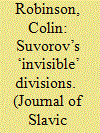| Srl | Item |
| 1 |
ID:
154833


|
|
|
|
|
| Summary/Abstract |
Among the most controversial questions associated with the German-Soviet War (1941–1945) is the degree to which intelligence information received from his agents abroad influenced the decision making of Josef Stalin, the Chairman of the Soviet Council of People’s Commissars and soon Generalissimo of the Soviet Union, particularly during the summers of 1941 and 1942, when Adolf Hitler’s German Wehrmacht conducted its strategic offensives code-named Operations Barbarossa and Blau. This article assesses this question by assessing the impact of intelligence reports Stalin received from Richard Zorge (Sorge in German), a Soviet agent situated in Tokyo, Japan, prior to and during the Barbarossa invasion.
|
|
|
|
|
|
|
|
|
|
|
|
|
|
|
|
| 2 |
ID:
154832


|
|
|
|
|
| Summary/Abstract |
This article is a presentation of the idea and first results of the activities of the international research project on the study of the body of enterprising military-political leaders during the Civil War in Russia. Within the framework of the project they are labeled ‘popular leaders’ [narodnyi vozhak]. The article contains information about publications that were issued within the framework of this project, scientific results that were obtained, and the prospects of developing this initiative.
|
|
|
|
|
|
|
|
|
|
|
|
|
|
|
|
| 3 |
ID:
154831


|
|
|
|
|
| Summary/Abstract |
The political ‘troubles’ that began in early 2015 between Turkey and the Russian Federation elicited interest in the history of relations between the two countries. However, the relationship between the two countries cannot be wiped out because it was already historically established in the 20th century. The main period of significance for the two countries was the relationship between Turkey and the Soviet Union during the Great Patriotic War [hereafter cited as the GPW]. This article uses facts based on information from Turkish and Soviet periodicals and from materials from the Foreign Policy Archive of the Russian Federation. The features of Turkey’s foreign policy at the beginning of the GPW and the relationship between the USSR and Turkey are examined.
|
|
|
|
|
|
|
|
|
|
|
|
|
|
|
|
| 4 |
ID:
154828


|
|
|
|
|
| Summary/Abstract |
NATO and Russia are locked in a self-reinforcing cycle of biased perceptions of each other. NATO and Russia entertain opposed world visions and conflicting narratives: This situation tends to create a ‘defensive inferiority’ syndrome that will be explored. In turn, NATO’s advances in Russia’s ‘near abroad’ are perceived as a threat by the Kremlin, thus maximizing the potential for errors and unwanted provocation that could trigger military escalation. Against this background, Russia has been negatively engaging NATO members through direct and indirect destabilization. If there is no such thing as a primer for Russian warfare, the second part of the article will show that the Kremlin’s strategy is far from unpredictable and can be defined as a ‘punish and spoil’ approach, i.e., a mix of brute force and unconventional means ranging from ‘hybrid’ warfare to ‘gray area diplomacy’.
|
|
|
|
|
|
|
|
|
|
|
|
|
|
|
|
| 5 |
ID:
154829


|
|
|
|
|
| Summary/Abstract |
In this study ‘things military’ refers to political, social, and cultural concerns related to (and derived from) the military and national security policy. The research scope is limited to the disciplines that are believed to have — albeit weak — basis in the country’s academic traditions. We argue that social study of things military is marked by parochialism and ‘intellectual autism’. Macedonia’s main incongruity — being a NATO candidate country and an object of international state-building — inevitably reflects on its academic community’s inability to sustain any critical reflection on things military both internally and internationally.
|
|
|
|
|
|
|
|
|
|
|
|
|
|
|
|
| 6 |
ID:
154830


|
|
|
|
|
| Summary/Abstract |
In 1982 the Soviet defector ‘Viktor Suvorov’ tantalizingly added an additional type of reserve formation to the Soviet Ground Forces’ three known categories of divisions. These ‘invisible’ divisions were to be established from the Ground Forces’ millions of reservists stiffened by a thin cadre of personnel joining from higher-category parent divisions. But beyond vague estimates in the IISS ‘Military Balance’ during the 1980s, there were very little more data. Now, with the publication of new works in Russian, and associated Russian forum discussions, a preliminary list of such divisions can now be translated into English. Many details are still unclear, but these data give us another window into the Ground Forces’ Cold War order of battle.
|
|
|
|
|
|
|
|
|
|
|
|
|
|
|
|